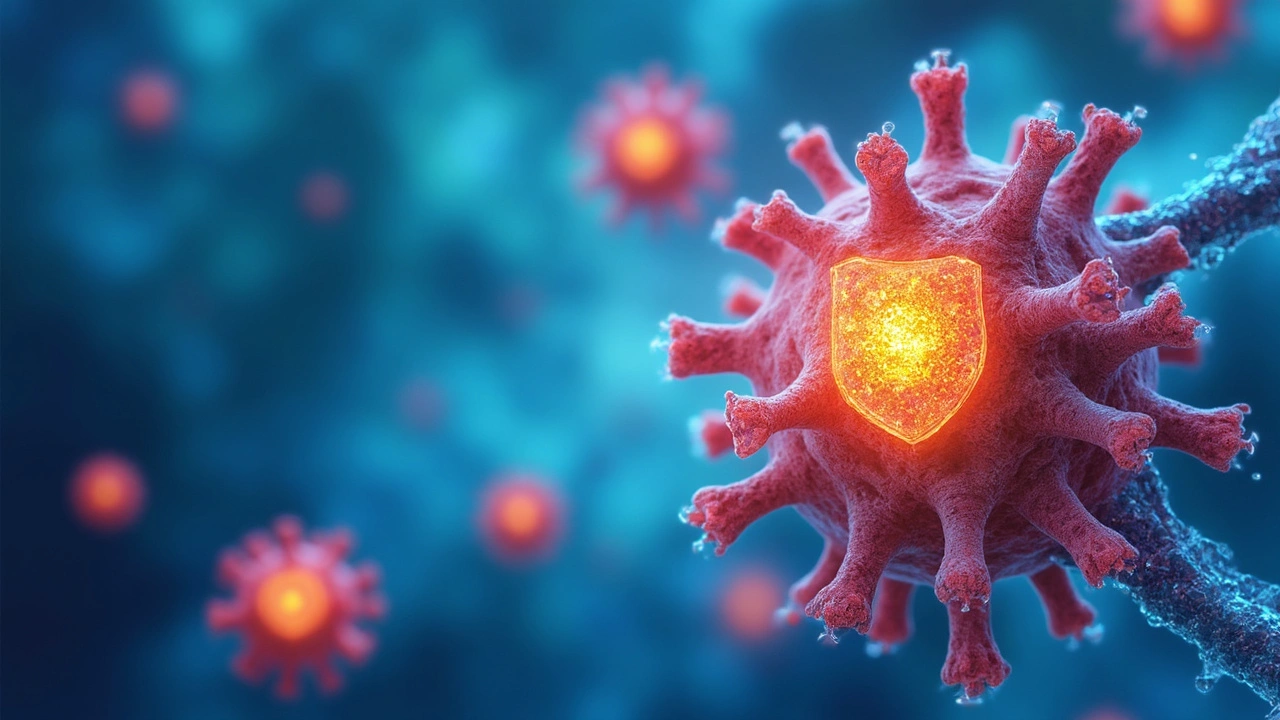It’s wild how a tiny plant with deep roots in Asian kitchens and ancient medicine cabinets could be the missing piece in your wellness puzzle. Imagine waking up without that usual sluggishness, or getting through cold and flu season with barely a sniffle while everyone else hunts for tissues. That’s where Alpinia comes in—the herb that’s quietly earning its place as one of nature’s hidden health boosters.
What Makes Alpinia a Potent Immunity Booster?
So, what sets Alpinia apart from a shelf full of generic multivitamins? For starters, we're not talking about some new lab creation. Alpinia, often called galangal, is in the ginger family but packs its own punch. It's been part of Chinese, Thai, and Ayurvedic traditions for centuries, not just as a flavor bomb in soups and curries, but as a go-to remedy for aches, infections, and fatigue. Now, modern science is catching up, showing that this root is loaded with compounds that help your immune system stay alert and ready. That’s a big deal when you’re trying to dodge bugs at work, in crowded spaces, or during seasonal changes.
Let’s break down what’s happening under the hood. The roots and rhizomes of Alpinia are bursting with powerful antioxidants and anti-inflammatory agents like galangin, alpinin, and flavonoids. These compounds aren’t just jargon—they actually get in there and help your body fight off free radicals, which are those unstable molecules that mess with your cells and immune defense. The journal "Nutrients" published a 2023 study showing that people who regularly took Alpinia supplements reported fewer sick days and milder symptoms when they did get ill. That’s not magic—that’s your cells getting a stronger shield.
But that's not all. Some of the same compounds boost activity in white blood cells, which are like your body's home security system for germs. When researchers gave volunteers Alpinia extract daily for eight weeks, their bloodwork showed a noticeable increase in Natural Killer (NK) cell levels. These cells are your body's front line, rushing out to attack viruses and bacteria the minute they show up. NK cells are why some people seem to breeze through cold season and rarely get laid up in bed.
Need something even more concrete? Check out this quick breakdown of active components and their immunity effects:
| Compound | Function | Recorded Effects |
|---|---|---|
| Galangin | Antioxidant, Anti-viral | Shields cells from oxidative stress and inhibits common viruses |
| Alpinin | Immunomodulator | Stimulates NK cell production and efficiency |
| Flavonoids | Anti-inflammatory | Reduces inflammation, supports faster recovery from infections |
Besides, many users notice perks like a more settled gut and clearer skin, which is no coincidence. A healthy gut microbiome is tightly linked to your immunity, and Alpinia’s antibacterial action helps keep your digestive biome in balance. It calms irritation, so if you’re often dealing with bloating, mild discomfort, or irregular digestion, this herb might do double duty for you.
So when you hear that Alpinia is an immunity booster, know it’s not just a marketing buzzword. It’s a genuine, science-backed plant ally that helps your body’s defense system operate at peak performance in the background—no cape needed.

The Science Behind Alpinia: Active Ingredients and Health Benefits
Ever wonder what’s really inside those little capsules or jars labeled “Alpinia dietary supplement”? You’re getting more than just a chunk of ground-up root. With top-quality supplements, extract makers use a careful method that keeps the good stuff, so you’re getting a focused dose of the bioactive compounds. That means each serving packs galangin, eugenol, and essential oils—all of which play a specific role in keeping your defenses high and your energy steady.
Let’s go deeper into what these actives do in your body. Galangin, for instance, doesn’t just float around; it goes after harmful invaders like viruses and certain bacteria. Lab experiments published by the University of Malaya in 2022 show that galangin slowed the growth of influenza viruses by almost 40%, making it harder for them to latch onto healthy cells. If you’re in a crowd or coming off a long trip, that gives your body a real fighting chance.
Eugenol, another major constituent, is kind of a multitasker. It calms minor inflammation (think those days when every joint aches for no reason), but it also promotes improved blood flow. Better circulation means your immune cells can reach the right places fast. Have you ever wondered why some wounds just refuse to heal or why colds seem to drag on? Sometimes it’s simply because your defenses aren’t mobilizing quickly. Better baseline circulation makes a quiet but important difference.
Alpinia doesn’t stop at immune cells or inflammation. Research from Thai universities puts a spotlight on its antioxidant score—actually, when you compare it to basic ginger or turmeric, Alpinia holds up shockingly well. Why does that matter? High antioxidant levels mean less damage to your DNA and fewer chances for nagging issues like chronic fatigue or even early aging to set in.
Hang on, there’s more. Traditional herbalists have long used Alpinia as a “warming” herb, saying it brings balance to the digestive system and fends off dampness (that’s their way of saying congestion and sluggishness). Turns out, even Western research is supporting that with proof it can help reduce IBS symptoms and support a healthy gut barrier. Studies published in "Frontiers in Pharmacology" in 2024 showed that daily Alpinia supplementation improved symptoms in over 68% of participants struggling with mild to moderate irritable bowel syndrome, particularly easing bloating and irregular bowel movements.
Here’s another fascinating tidbit—it appears Alpinia may play a part in longevity. The root’s compounds support cellular repair by activating specific pathways (like the Nrf2 pathway) responsible for rejuvenation. That’s a lot for one plant to handle, but people in rural Thailand and southern China—where Alpinia is a daily staple—are noted for their strong immune systems and surprisingly active golden years, and scientists are starting to draw a link.
The health perks just keep stacking up. Early investigations suggest that Alpinia might offer gentle support for blood sugar regulation, making it useful for people watching their glucose swings. There’s even preliminary evidence from Japanese labs hinting that it helps reduce cholesterol buildup. All this, just from adding a simple supplement.
Here’s a quick rundown of what users often notice after a month on Alpinia:
- Fewer days battling cold or flu
- Quicker recovery when you do fall ill
- More consistent energy—no slumps after meals
- Better digestion; reduced bloating or gassiness
- Sharper focus on busy afternoons
- Calmer skin, thanks to balanced inflammation
This isn’t to suggest Alpinia is a cure-all, but it has definitely earned its place in your supplement lineup if strong, steady immunity and everyday comfort matter to you.

How to Use Alpinia Dietary Supplement for Best Results
Ready to try Alpinia, but wondering how to start? It’s not complicated, but like any supplement, how you use it matters. First off, sourcing counts. Go for brands that specify “Alpinia galanga” and show clear extraction methods. Look for a standardized extract if you can (most good brands will share this info on the label), which ensures you’re getting a steady kick of those immune-friendly compounds every time.
Typical dosages for adults run from 250 mg to 500 mg a day. It’s usually easiest to take it with a meal, since the natural oils help your body absorb what it needs. There’s no race to double up—more isn’t always better, and most studies show that steady, daily use is the ticket to long-term results. If you’re looking to dial in to specifics, people dealing with high stress, frequent sickness, or chronic inflammation can up their dose under a practitioner’s guidance. Just like with any herbal product, your individual reaction might vary a bit—so start with the lower end if you’ve never tried Alpinia before.
If you prefer natural sources, Alpinia root is also available in dried slices (think Asian grocery stores), making it easy to slip into teas, broths, or smoothies. But let’s be real—supplements are simply more convenient for most people, especially when you want to track and manage your dosage. For people already taking prescriptions, check with a doctor before adding it in, just to avoid unplanned interactions (especially if you’re on blood thinners).
Stick with it for several weeks. Most folks notice subtle changes—less bloating, improved mood, sharper focus—within ten to fourteen days, but immune shifts tend to be steady and low-key. It’s not like flipping a switch; think of it more like steadily reinforcing the walls of your immune fortress, layer by layer.
Let’s run through a few tips for success with your Alpinia supplement routine:
- Take it at the same time daily—habit is key for results.
- Combine with a balanced, whole-foods diet rich in fruits and veggies. Antioxidants work best as part of a larger team effort.
- Don’t skip sleep—immune boosters help, but deep rest is your foundation.
- Stay hydrated. Water flushes out toxins and helps all those good plant compounds circulate efficiently.
- Consider pairing Alpinia with probiotics for double-duty gut and immune health.
Here’s a little hack: if you feel a sore throat or stuffy nose coming on, some people double their usual dose for two days (never exceeding the upper limit of 1000 mg per day unless guided by a healthcare pro). They often report quicker bounce-backs. If you’re tracking results, jot down how you feel each day for a month—you might spot patterns you’d otherwise miss.
One last point worth mentioning: Alpinia is well-tolerated by most folks, but rare side effects like mild heartburn or skin irritation can happen, especially with very high doses. So always start slow, and pay attention to how your body reacts. If something feels off, pause and chat with a practitioner.
Bottom line: Adding Alpinia dietary supplement is a simple tweak that can mean fewer sick days, better digestion, and a little more pep. It won’t replace the basics—good food, plenty of water, regular movement, and enough sleep. But it’s a solid, science-backed ally for keeping your body’s defense system in top shape, naturally.


Sarah Aderholdt
May 17, 2025 AT 16:43Alpinia’s blend of galangin and flavonoids gives a solid boost to the immune front line while keeping inflammation in check. The herb’s roots have been used for centuries, so we’re not chasing a fad but a time‑tested ally. Pair it with a balanced diet and you’ll likely notice steadier energy and fewer sniffles during the season.
Michael Stevens
May 17, 2025 AT 16:46I hear you, Sarah-adding a daily Alpinia capsule is a low‑effort habit that can mesh nicely with other healthy routines. If you track how you feel, the subtle improvements in digestion and focus become more obvious over a few weeks. Keep the dosage consistent and stay hydrated, and your body will thank you.
Larry Douglas
May 17, 2025 AT 16:51Alpinia galanga contains a spectrum of bioactive compounds that interact with cellular pathways in a measurable way. Galangin acts as a direct antioxidant scavenging free radicals that would otherwise damage DNA. Alpinin influences the proliferation of natural killer cells which are critical for early viral clearance. Flavonoids reduce the expression of pro‑inflammatory cytokines and thereby temper chronic inflammation. Research from the journal Nutrients in 2023 documented a statistically significant reduction in sick days among participants who adhered to a daily regimen. The study also reported lower severity scores for common cold symptoms when Alpinine was present in the bloodstream. In vitro assays have shown that eugenol improves microcirculation by relaxing smooth muscle in blood vessels. Better circulation facilitates the rapid deployment of immune cells to sites of infection. The Nrf2 pathway activation by Alpinia extracts supports cellular detoxification processes. This mechanism may explain observed benefits in oxidative stress markers. A separate trial in Thailand demonstrated improvements in irritable bowel syndrome symptoms after eight weeks of supplementation. The gut microbiome balance appears to shift toward beneficial taxa, which is known to have a downstream effect on systemic immunity. While the herb is generally well tolerated, rare cases of mild heartburn have been reported at high dosages. It is advisable to start with the lower end of the recommended range and monitor individual response. Combining Alpinia with probiotic strains could amplify gut‑associated immune benefits according to emerging research. Overall the cumulative evidence suggests that Alpinia is more than a culinary spice it is a functional ingredient with multi‑system support.
Phoebe Chico
May 17, 2025 AT 16:56Wow Larry you just turned a supplement summary into a poetic science lecture – love the flair! It’s like mixing a superhero cape with a kitchen spice rack, and honestly the idea of eugenol giving your blood a little “zoom‑zoom” feels as exciting as fireworks on the Fourth of July. Keep those facts coming and the community will be grabbing Alpinia like it’s a patriotic secret weapon for our health.
Ann Campanella
May 17, 2025 AT 17:01Sounds like a gimmick, but okay.